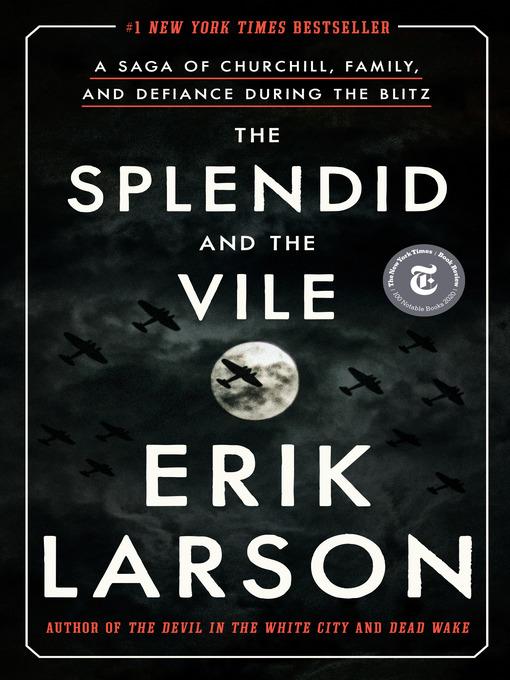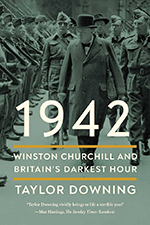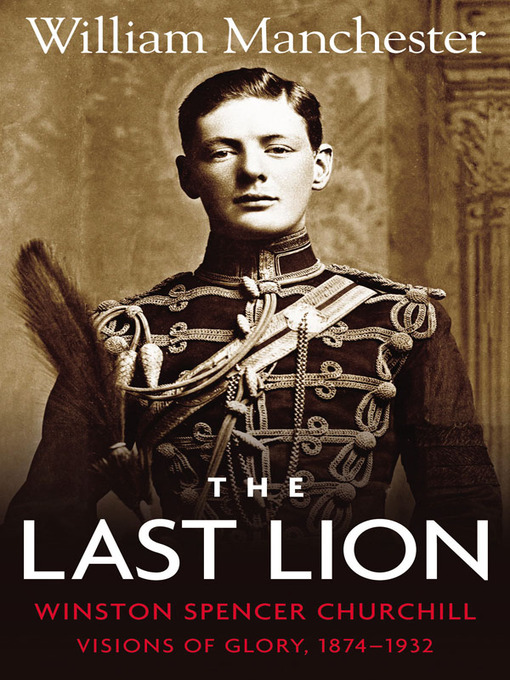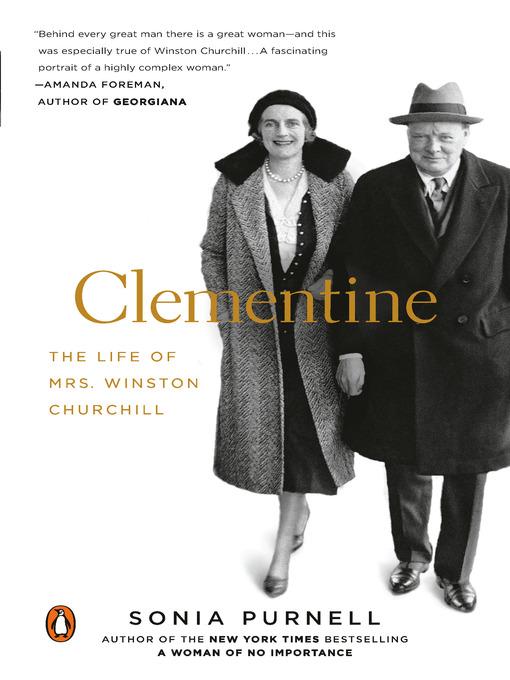 The Splendid and the Vile
The Splendid and the Vile
by Erik Larson
GENRE: Nonfiction, Biography, History, WWII
A riveting day-to-day account of Winston Churchill’s early days as Prime Minister when Great Britain was under attack and stood alone against Nazi Germany. Drawing upon original archival documents and recently released intelligence reports, this work of nonfiction reads like a fast-paced thriller.
 Author Biography
Author Biography
Erik Larson is the author of eight books, six of which became New York Times bestsellers. His latest books, The Splendid and the Vile: A Saga of Churchill, Family, and Defiance During the Blitz and Dead Wake: The Last Crossing of the Lusitania, both hit no. 1 on the list soon after launch. His saga of the Chicago World’s Fair of 1893, The Devil in the White City, was a finalist for the National Book Award, and won an Edgar Award for fact-crime writing; it lingered on various Times bestseller lists for the better part of a decade. Hulu plans to adapt the book for a limited TV series, with Leonardo DiCaprio and Martin Scorsese as executive producers. Erik’s In the Garden of Beasts, about how America’s first ambassador to Nazi Germany and his daughter experienced the rising terror of Hitler’s rule, has been optioned by Tom Hanks for development as a feature film.
Erik’s first book of narrative nonfiction, Isaac’s Storm, about the giant hurricane that destroyed Galveston, Texas, in 1900, won the American Meteorology Society’s prestigious Louis J. Battan Author’s Award. The Washington Post called it the “Jaws of hurricane yarns.” Erik is particularly pleased to have won the Chicago Public Library Foundation’s 2016 Carl Sandburg Literary Award for Non-Fiction.
He graduated summa cum laude from the University of Pennsylvania, where he studied Russian history, language and culture; he received a masters in journalism from Columbia University. After a brief stint at the Bucks County Courier Times, Erik became a staff writer for The Wall Street Journal, and later a contributing writer for Time Magazine. His magazine stories have appeared in The New Yorker, The Atlantic Monthly, Harper’s, and other publications.
He has taught non-fiction writing at San Francisco State, the Johns Hopkins Writing Seminars, the University of Oregon, and the Chuckanut Writers Conference in Bellingham, Wash., and has spoken to audiences from coast to coast. A former resident of Seattle, he now lives in Manhattan with his wife, a neonatologist, who is also the author of the nonfiction memoir, Almost Home, which, as Erik puts it, “could make a stone cry.” They have three daughters in far-flung locations and professions. Their beloved dog Molly resides in an urn on a shelf overlooking Central Park, where they like to think she now spends most of her time. - Author's website
Publisher's Weekly
/* Starred Review */ Larson (Dead Wake) delivers a propulsive, character-driven account of Winston Churchill’s first year as British prime minister (May 1940–May 1941), when the German air force launched “a full-on assault against the city of London” in preparation for an invasion that never came. Larson’s profile subjects include Churchill’s 17-year-old daughter, Mary; his private secretary, John “Jock” Colville, who kept a meticulous (and likely illegal, due to the national security secrets it revealed) diary; Nazi leader Rudolf Hess; and, to a lesser extent, ordinary Britons. Juxtaposing monumental developments, such as the Dunkirk evacuation, with intimate scenes, Larson notes that on the night Churchill learned French leaders wanted to make peace with Hitler, he raised his dinner guests’ spirits by passing out cigars, reading aloud telegrams of support from other countries, and “chant the refrain from a popular song.” Larson highlights little-known but intriguing figures, including chief science adviser Frederick Lindemann, who made a multifaceted but unsuccessful case for why tea shouldn’t be rationed, and documents the carnage caused by German bombs, including the deaths of 34 people at the Café de Paris shortly before Mary Churchill was set to arrive at the club. While the story of Churchill’s premiership and the Blitz have been told in greater historical depth, they’ve rarely been rendered so vividly. Readers will rejoice. Agent: David Black, the David Black Agency. (Feb.) --Staff (Reviewed 02/17/2020) (Publishers Weekly, vol 267, issue 7, p).
Library Journal
In this illuminating history, best-selling writer Larson (Dead Wake) offers context for and understanding of Britain's defense against Hitler's Germany under Winston Churchill's leadership during World War II. Focusing on a single year (May 1940–May 1941), which coincided with Churchill's appointment as Prime Minister, Larson presents a near-daily account through a combination of diary and journal entries, archives, and new reports from Churchill's family, including his wife Clementine and his children, as well as officials from Britain, Germany, and the United States. The picture he paints unearths the intimate details of Churchill's family and cabinet, leadership style, personality, and idiosyncrasies, all of which laid the foundation for his determination to unite Britain during this national emergency while also navigating the monumental task of keeping the United States and President Roosevelt close at hand. VERDICT Blending a gripping narrative and a well-researched examination of personal and news archives, Larson's distinctive history of Britain's "darkest hour" offers a new angle for those already familiar with this era, while attracting readers who wish to learn more about the notable leader. (Library Journal, Feb. 2020 Vol. 145, Issue 2, page 98)
Kirkus Reviews
/* Starred Review */ The bestselling author deals with one of the most satisfying good-vs.-evil battles in history, the year (May 1940 to May 1941) during which Churchill and Britain held off Hitler. Bookshelves groan with histories of Britain's finest hour, but Larson (Dead Wake: The Last Crossing of the Lusitania, 2015, etc.) employs a mildly unique strategy, combining an intense, almost day-to-day account of Churchill's actions with those of his family, two of his officials (Frederick Lindemann, who was Churchill's prime science adviser, and Lord Beaverbrook, minister of air production), and staff, including private secretary Jock Colville and bodyguard Walter Thompson. Since no one doubted they lived in extraordinary times and almost everyone kept journals and wrote letters, the author takes full advantage of an avalanche of material, much of which will be unfamiliar to readers. Churchill remains the central figure; his charisma, public persona, table talk, quirks, and sybaritic lifestyle retain their fascination. Authors have not ignored his indispensable wife, Clementine (Sonia Purnell's 2015 biography is particularly illuminating), but even history buffs will welcome Larson's attention to their four children, especially Mary, a perky adolescent and his favorite. He makes no attempt to rehabilitate Winston's only son, Randolph, a heavy-drinking spendthrift whose long-suffering wife, Pamela, finally consoled herself with a long affair with American representative Averell Harriman, which was no secret to the family and was entirely approved. Britain's isolation ended when Germany invaded the Soviet Union on June 22, 1941, but Larson ends on May 10. The Blitz was in full swing, with a particularly destructive raid on London, but that day also saw Rudolf Hess, Hitler's second in command, fly to England and engage in a wacky attempt (planned since the previous autumn) to negotiate peace. Nothing came of Hess' action, but that day may also have marked the peak of the Blitz, which soon diminished as Germany concentrated its forces against the Soviet Union. A captivating history of Churchill's heroic year, with more than the usual emphasis on his intimates. (Kirkus Reviews, February 1, 2020).
 1942: Winston Churchill and Britain's Darkest Hour
1942: Winston Churchill and Britain's Darkest Hour
by Taylor Downing
Eighty years ago, Britain stood at the brink of defeat.
In 1942, a string of military disasters engulfed Britain in rapid succession : the collapse in Malaya; the biggest surrender in British history at Singapore; the passing of three large German warships through the Straits of Dover in broad daylight; the longest ever retreat through Burma to the gates of India; serious losses to Rommel's forces in North Africa; the siege of Malta and the surrender at Tobruk.
All of this occurred against the backdrop of catastrophic sinkings in the Atlantic and the Arctic convoys. People began to claim that Churchill was not up to the job and his leadership was failing badly. Public morale reached a new low. Taylor Downing’s 1942 explores the story of frustration and despair of that year, prompting Winston Churchill to demand of his army chief, "Have you not got a single general who can win battles?” Using newly discovered archival material, historian Taylor Downing shows just how unpopular Churchill became in 1942, with two votes attacking his leadership in the House of Commons and the emergence of a serious political rival.Some argue that Britain's most precarious moment of the war was in 1940—when the nation stood up against the threat of German invasion during the Battle of Britain. But in 1942, Taylor Downing describes, in nail-biting detail, what was really Britain's darkest hour of World War II.
 The Last Lion
The Last Lion
by William Manchester
Describes the early life and political career of the British Prime Minister Winston Churchill.
 Clementine
Clementine
by Sonia Purnell
A portrait of Winston Churchill's extraordinary wife and her lesser-known role in World War II discusses her relationship with political mentor Eleanor Roosevelt, her role in safeguarding Churchill's health throughout key historical events and her controversial family priorities.